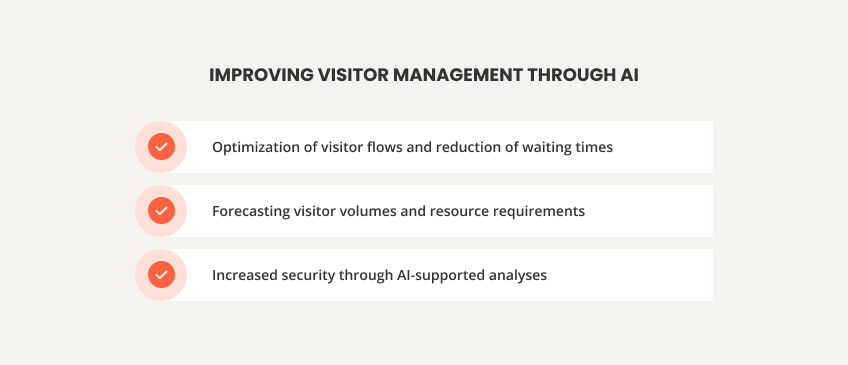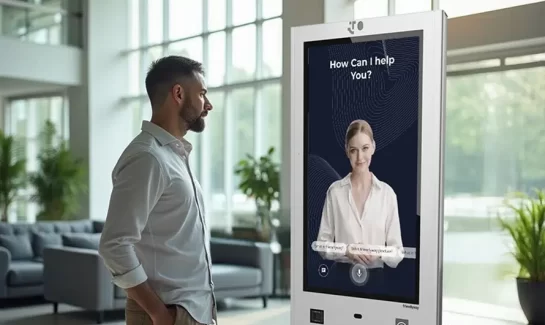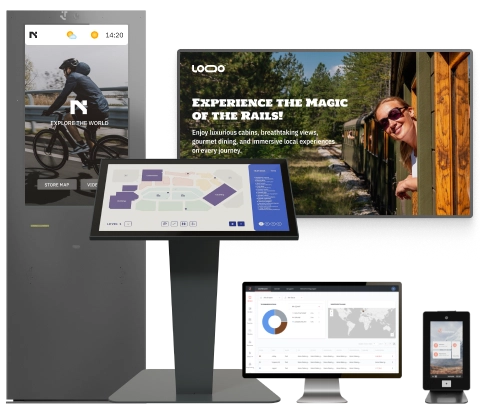
Digitalization has reshaped many areas of day-to-day business, and visitor management is no exception. At the forefront of digital transformation is artificial intelligence (AI), helping organizations manage visitors with greater efficiency and ease. AI-powered solutions bring the benefits of intelligent virtual assistants to streamline processes and create seamless visitor experiences.
In this article, we’ll explore the fundamentals of AI in visitor management, its practical applications, the improvements it offers, and what the future holds for this game-changing technology.
Basics of AI-Powered Visitor Management
Definition and functionality of an AI assistant
An AI assistant is a software-based solution that uses algorithms and machine learning to perform tasks autonomously and continuously optimize its results. Using AI in visitor management enables the automation of routine tasks, the coordination of scheduling, and the provision of personalized information, which leads to improved visitor care. The functionality is based on the analysis of data and the ability to recognize patterns, enabling the AI assistant to make decisions and suggestions.
Discover seamless efficiency and unparalleled security with our cutting-edge digital solution.
Advantages over conventional systems
An AI-powered visitor management system offers numerous advantages over traditional systems. The most important of these include the automation of recurring tasks, the reduction of human error, and increased efficiency.
Digital reception is simplified through self-service and the automation of visitor management, ensuring seamless customer care. Smart offices also benefit from an AI assistant, which offers smooth visitor registration and efficient appointment scheduling.
While conventional systems often rely on manual input, an AI assistant can perform many processes in the background, relieving the staff’s burden. In addition, AI allows for a more precise analysis of visitor flows, which enables better planning and optimization.
Multilingual chatbots and avatars
AI assistants can have different interfaces in visitor management, including a chatbot and an animated talking avatar. An AI avatar is a digital representation of a person generated using AI based on real humans with lifelike facial expressions, voice, and lip-syncing. The avatar interacts with visitors through natural language, making them seem human and approachable.
One of the biggest advantages of an AI avatar is its ability to communicate with people in different languages easily. Advanced computational linguistics has enabled virtual assistants to understand and respond in multiple languages. This is particularly valuable for international visitors and helps to improve customer satisfaction.
Integration into existing visitor management solutions
Another benefit is the possibility of integrating AI assistants seamlessly into existing visitor management solutions. Many companies already use digital systems for visitor registration or appointment scheduling. An AI assistant can supplement tools like Microsoft 365, other platforms, and mobile apps without replacing existing infrastructures. This flexibility allows the new technology to be implemented step by step.
Enhance your visitor management strategy by leveraging AI-driven analytics for informed decision-making.
AI Applications in Visitor Management
Automated visitor check-in and registration
One of the most common applications of AI in visitor management is automated visitor check-in and registration. Thanks to AI technology, visitor tracking is improved, which contributes to workflow optimization. The AI assistant can capture, process, and store visitor information in real-time, speeding up registration and ensuring a smooth reception process. In addition, visitors can be notified and informed in advance via email or an app, which reduces waiting times at reception.
Intelligent scheduling and room allocation
Scheduling and allocation of meeting rooms is another area where AI assistants excel. With AI, appointments can be scheduled more efficiently, and rooms can be assigned automatically based on the number of participants and specific requirements. This prevents overbooking and ensures optimal room utilization.
Personalized visitor experiences
An AI assistant can offer visitors personalized experiences by considering individual preferences and needs. For example, a returning visitor could be automatically placed in a preferred meeting room, and the assistant could provide them with relevant information and recommendations based on their previous visits. This contributes to visitor satisfaction and enhances a positive perception of the company.

Improving Visitor Management Through AI
Optimization of visitor flows and reduction of waiting times
A central goal of AI-supported visitor management is to optimize visitor flows and minimize waiting times. With the help of real-time data analysis, the assistant can control the flow of visitors and ensure that bottlenecks are avoided. Waiting times can be dynamically adjusted, and visitors can be offered alternatives, such as using waiting areas or alternative appointment slots.
Forecasting visitor volumes and resource requirements
By using AI, companies do not only monitor the current visitor status. They can also predict future visitor flows and the associated resource requirements. The AI assistant analyzes historical data and creates forecasts to help plan staff deployment and space utilization. This enables companies to respond better to peak times and ensure sufficient resources are available.
Increased security through AI-supported analyses
Artificial intelligence in visitor management enables innovative solutions that optimize security management. By analyzing visitor data, the AI assistant can identify potential security risks. For example, it can recognize unusual behavioral patterns or compare visitor data with security lists. These functions help increase the security level in the company without slowing down the processes at the reception desk.

Practical Examples and Use Cases
AI assistant in the reception area
In reception, an AI assistant can take over the registration process, from recording visitor data to issuing a visitor badge. This reduces manual effort and allows the reception team to focus on other tasks. In conjunction with digital visitor management, the AI assistant can also monitor the scheduled time of the appointment and notify the visitor as soon as the host is available.
Virtual concierge services
An AI assistant acting as a virtual concierge can greet visitors, answer their questions, or provide information about available services and current offers. Such systems are already being used in many modern office buildings to give visitors a smooth and pleasant experience.
AI-supported visitor guidance
Guiding visitors through a company building or event can also be made more efficient using AI. Visitors get the best route to their destination using an app or an interactive digital signage display. These dynamic instructions are based on real-time data and can automatically adapt to changing conditions.

Implementation and Integration
Steps towards the introduction of an AI assistant
The introduction of an AI assistant begins with an analysis of the existing visitor management processes. This is followed by selecting a suitable AI solution that meets the company’s requirements. Implementation usually takes place in stages to ensure a smooth integration.
Training of employees and visitors
A key part of the implementation is training employees and supporting visitors using the new system. Employees should be able to use the AI assistant effectively, while visitors should be made aware of the changed digital processes to ensure the highest possible level of acceptance.
Data protection and security aspects
Using AI in visitor management requires special data protection and security measures. All personal data should be collected and processed following the applicable data protection regulations. In addition, security mechanisms should be implemented to protect access to sensitive data.

Future Prospects
Further development of AI technology
The further development of AI technology will continue to transform visitor management in the coming years. New algorithms and improved data processing methods will further increase the accuracy of predictions and make it possible to manage visitor flows even more efficiently.
Potential new fields of application
In addition to the already established application areas, AI could play a greater role in major event management. Here, intelligent systems could monitor and adjust real-time visitor flows.
Trends in human-AI interaction
An important trend is the increasing interaction between humans and AI. Voice-controlled systems and intelligent assistants will make interaction with visitor management systems even more natural and intuitive over time.
FAQ
AI optimizes processes, reduces waiting times, and offers improved visitor experiences.
The possibilities offered by AI assistants are vast, ranging from personalized interactions and heightened security to operational efficiency and insightful data analytics.
No, AI supports employees but does not replace them.
Data protection guidelines and security measures ensure the protection of visitor information.
The costs vary depending on the scope and complexity of the solution. For a cost estimate, contact friendlyway, which offers an AI assistant as part of its visitor management system.
Open interfaces, APIs, and customization options make integration with existing platforms such as Microsoft Teams or company websites and mobile apps easy.
Companies in the service sector, large event organizers, and office building managers are among those most benefitting from the technology.



